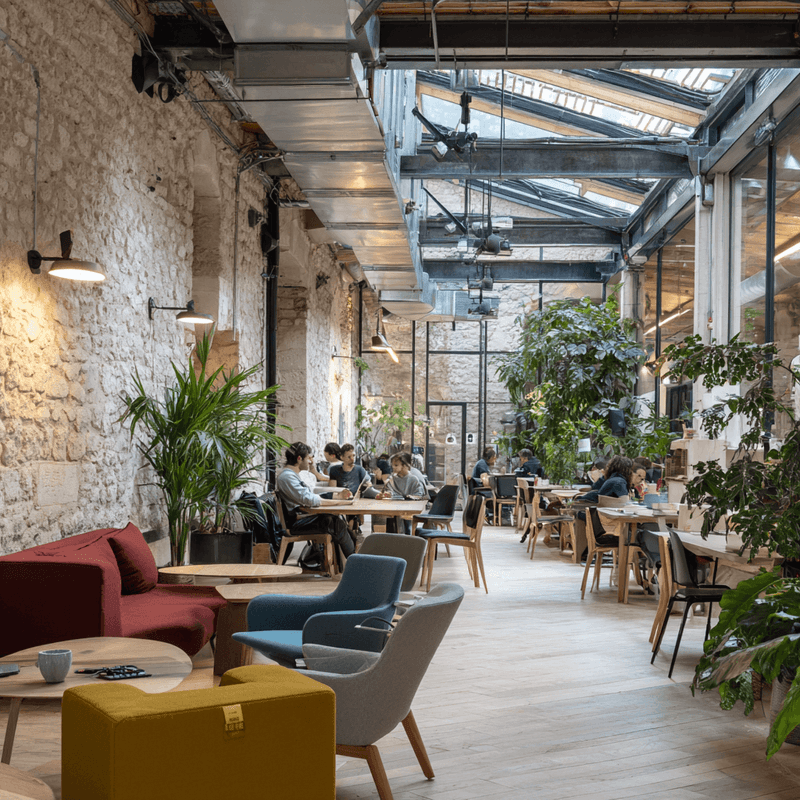
In the media and in the HR policies of a number of companies across the Atlantic, we are beginning to see an assertive backtracking on the issue of remote working. This RAB (Retour Au Bureau) seems to be orchestrated for reasons of productivity and a significant decline in social ties. However, while some French companies, such as Publicis and Groupama Immobilier, seem keen to follow in the footsteps of the Silicon Valley giants, it's not so much a question of calling the model into question as it is of providing a better framework for practices. In the age of hybrid work, French employees (70%) are only prepared to give up what they've already acquired in exchange for additional financial benefits, as KPMG's CEO Outlook 2023 study underlines. On the contrary, they even advocate the possibility of working more in model working environments such as coworking spaces as a right. Organizations be damned! Flexible working, and with it coworking spaces, still have a bright future ahead of them. Telecommuting is dead, long live coworking!
Back to the office: why do some companies want to put an end to telecommuting?
Meta, Google, Saleforce and Golman Sachs have all been voicing their distrust of telecommuting for some months now. But why such a backlash? And how can the balance of power have shifted so dramatically?
First of all, it should be noted that the back-to-work trend, initiated by the Americans, is taking place in a market environment that is less favorable to employees. Indeed, the " great resignation " phenomenon is coming to an end in the USA due to the slowdown in the economy and in hiring, and could even lead to waves of redundancies in the years to come. Efficiency and productivity are the central pillars of Gafam strategy. And so, across the Atlantic, it's no longer the case that employees' needs are really taken into account, since companies are no longer afraid of offending their employees' sensibilities by going back on telecommuting.
Among the most frequently cited official arguments, however, are : the fact that telecommuting is not appropriate for the younger generation, that it can be a hindrance to access to information or career developmentvelopment of a career, that it can be detrimental to productivity, or that it doesn't help build loyalty and a sense of belonging among employees.
Of course, we have arguments and studies to counter each of these points!
In France, the questioning of telecommuting is not at all part of the same context, since it is the employees themselves who are questioning the conditions of access and implementation of telecommuting... but absolutely not its concept.
Telecommuting: French employees have the upper hand
Any company facing recruitment challenges today cannot afford to take a step backwards on the subject of telecommuting. In terms of image and employer brand, this would go against all principles of attractiveness and common sense.
French companies cannot ignore the expectations of French employees, who have massively embraced hybrid working since 2020, and who are far from wishing the golden age of telecommuting to come to an end. According to an OpinionWay survey for Slack carried out in October 2023, 62% of them still want to telework at least half the week, but 93% say they want to be in the office with their colleagues at least once a week.
The ideal work rhythm recognized by these employees would be 3 days of face-to-face teamwork. However, while organizations are now gearing up to welcome more services and flexible spaces, they are not yet able to offer the same quality of service as coworking spaces, which are recognized for their great flexibility and innovative offerings.
The above-mentioned study even indicates that for 30% of teleworkers, a return to the office would be synonymous with a drop in productivity, and an increase in working hours. Data correlated in the study conducted by the Scoop company, which establishes a clear link between telecommuting and productivity: companies that opted for flexibility saw their growth increase exponentially (+21% on average), compared with those that imposed a return to the office on their employees.
Coworking rather than telecommuting
Maintaining work-life balance is at the heart of the new paradigm in work organization models. A principle that fits perfectly with hybrid working.
If there's one thing that all the talk about returning to the office and telecommuting illustrates, it's that there's a marked desire to return to places where people can get together and enjoy each other's company. Companies are therefore turning to coworking spaces to help them telework in hybrid mode and as a team.
What's more, coworking spaces tend to offer models that are increasingly similar to those derived from hotel codes, and offer innovative and experiential services that companies would not be able to provide on their own. These strengthen team cohesion and the feeling of belonging to a group.
The world of the "all-office" or "all-telework" is a thing of the past. The future is being written in hybrid mode. The transformation of the commercial real estate market, with the rise of Proptechs and the acquisition of coworking spaces by major international groups, confirms this trend. Expect to see coworking in the months and years to come. Coworking hasn't said its last word!
-
How can the flexible office reconcile real-estate costs and employee expectations?

05/01/2026 How can the flexible office reconcile real-estate costs and employee expectations?
For decades, the office has been seen as an immutable anchor: an assigned position, a fixed desk, a space designed to accommodate every employee from Monday to Friday, between 9am and 6pm. But this model, long considered indisputable, is now faltering under the impact of profound transformations in the world of work. Massive telecommuting, renewed employee expectations, the search for balance and meaning, and economic pressure on real estate are all forcing organizations to rethink their approach.
-
From cost reduction to cultural transformation: the real challenges of the flexible office

15/12/2025 From cost reduction to cultural transformation: the real challenges of the flexible office
Giving up personal office allocation was no longer seen as an upheaval, but rather as an obvious way of reducing costs, improving real estate efficiency and adapting spaces to contemporary uses. However, the companies that have taken the plunge recognize that the reality far exceeds this initial justification. A genuine cultural transformation was underway!
-
Does coworking restore the value of work?

08/12/2025 Does coworking restore the value of work?
Today, many organizations see Coworking as more than just a real estate service; they see it as a space capable of restoring value to work itself and re-engaging teams. But what exactly is this "value" that coworking claims to restore?